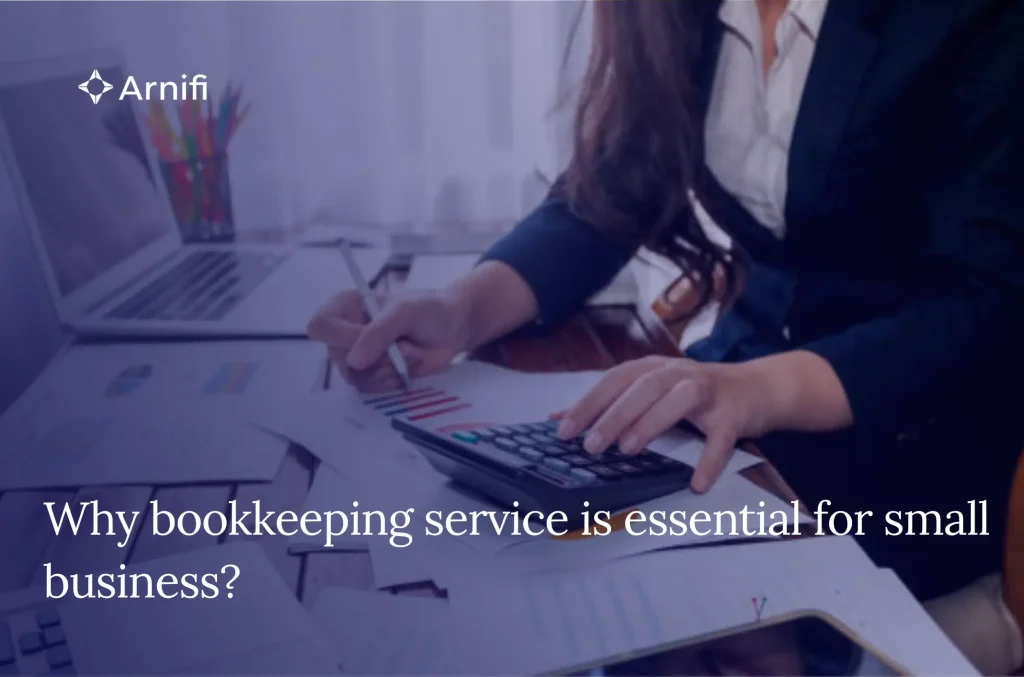Why bookkeeping service is essential for small business?
by Shethana Nov 24, 2025  6 MIN READ
6 MIN READ

A bookkeeping service for small business is not a luxury; it is the control panel for tax and decision-making while avoiding penalties. Clean books keep payroll on time and bank balances predictable.
In the UAE, filings for VAT and (where relevant) corporate tax depend on ledgers that reconcile to source documents and bank records. The Federal Tax Authority expects VAT returns and payments through EmaraTax, backed by proper records. Weak bookkeeping makes even simple filings slow and risky.
What Good Bookkeeping Actually Does Each Month
Bookkeeping is the disciplined capture of every money event, not a once-a-year tidy-up. Done well, it:
- Records sales, purchases, receipts, and payments to the right accounts, with VAT codes applied correctly for UAE returns.
- Reconciles bank, card, and payment gateways so cash on the balance sheet matches statements.
- Prepares management reports that owners can act on, instead of waiting for year-end. Guidance from professional bodies has long linked reliable bookkeeping with stronger SME decision-making and funding access.
Why UAE Compliance Starts With the Ledger
Regulators care about evidence. The FTA’s VAT process requires accurate returns and payments through its portal. That is only possible when sales, purchases, and VAT codes have been posted cleanly to subledgers and reconciled to bank proof.
Separately, UAE company law expects businesses to keep proper accounting books for inspection and to retain them for at least five years. So sloppy record-keeping creates real legal risk.
Signs Your Business Needs Expert Assistance
One probably need professional support if any of these feel familiar:
- Cash in the bank never matches the system balance.
- VAT return prep means chasing invoices at month-end, every time.
- Suppliers stop shipping because statement balances do not agree.
- One cannot produce a creditor aging or a sales ledger that ties to revenue.
What a Tight Month-End Close Looks Like
Here is a practical monthly rhythm used by strong finance teams:
- Lock a cutoff date, then post all invoices received by that date.
- Reconcile every bank and wallet; investigate any difference on the same day.
- Run VAT exception reports, fix miscoded entries, and match to supporting documents for EmaraTax.
- Produce a one-page pack: P&L, balance sheet, cash summary, and a short note on risks and next-month focus. Guidance for SMEs consistently links this discipline with better decisions and investor confidence.
Choosing In-House, Outsourced, Or Hybrid Without Losing Control
Some owners like a desk in the office and daily touches. Others prefer a cloud workflow handled offsite. Both can work. What matters is segregation of duties, documented procedures, and clear access to systems. Many SMEs choose to outsource bookkeeping services for your small business while keeping approvals and payments in-house to preserve control and speed. A modern provider will:
- Work in your cloud ledger, not a private system.
- Share a close calendar and task list one can see.
- Provide monthly reports that tie back to bank statements and tax returns.
Understanding the Cost of Bookkeeping Services for Small Business
Prices vary by volume, complexity, and who does the work. Common models use fixed monthly packages for startups. As transactions grow, firms shift to tiered pricing and charge separate fees for payroll or inventory.
The value test is simple: does the service produce reconciled ledgers, VAT-ready reports, and on-time filings, every period? If yes, the service pays for itself by ensuring fewer penalties, faster collections, and better cash calls.
Software Stack That Fits UAE SMEs
Pick a cloud ledger with bank feeds, strong VAT support, and audit trails. The goal is a clean link between invoices, payments, and VAT boxes so your EmaraTax return compiles without manual spreadsheets. The less one exports to CSV, the fewer errors to chase later. The FTA’s digital flow rewards businesses that keep records in order and can substantiate entries quickly.
Controls That Keep the Books Trustworthy
- Vendor master data should hold tax registration numbers and IBANs to avoid payment and VAT errors.
- Number your invoices sequentially and store scans with searchable names.
- Require two people for payment release: preparer and approver.
- Keep a simple policy note on revenue cut-off, petty cash, and refunds so everyone posts the same way.
Onboarding Checklist for an Outsourced Start
When one hands the books to a provider, insist on a structured start:
- Chart of accounts review to match your business model.
- Opening balance agreement to prior statements and tax returns.
- Bank, card, and gateway connections tested with read-only access first.
- Evidence binder created with contracts, leases, and key tax registrations.
How Bookkeeping and Accounting Services for Small Businesses Support Tax and Funding
Bankers and investors respond to rhythm and reliability. When your ledgers close on the same day every month and cash forecasts reconcile to reality, term sheets and credit limits get easier.
Equally, tax agencies expect consistent, well-supported filings. The FTA’s VAT process and penalties framework assume the business can produce records and pay on time through EmaraTax. Being orderly reduces risk and correspondence.
Final Advice
Strong bookkeeping powers tax filings and credible plans. Start with a simple close calendar, insist on reconciliations, and keep documents tidy for at least five years.
Prefer a partner to run the engine perfectly? Consider hiring Arnifi’s expert bookkeeping service for small business providers that gives live access, audit trails, and VAT-ready packs each month.
Arnifi can set up the workflow, handle the entries, and prepare compliant files for VAT and year-end.
FAQs
Do I still need an accountant if I use a bookkeeper?
Yes. Bookkeepers post daily activity and prepare period files; accountants review, advise, and sign off year-end or audit work. SME research consistently promotes professional accountants in small firms for better control and growth.
How long must UAE businesses keep records?
At least five years under UAE company-law standards for accounting books and supporting documents. Certain sectors or assets may require longer.
Can clean bookkeeping speed VAT filing?
Yes. If entries carry the right VAT codes and match invoices and bank proof, EmaraTax filing is straightforward and faster to reconcile.
What should I expect each month from a provider?
Reconciled bank and wallet accounts, up-to-date ledgers, VAT exception fixes, and a short report that are easy to understand. That is the baseline for good decisions and compliance.
Top UAE Packages

Related Articles
Top UAE Packages



